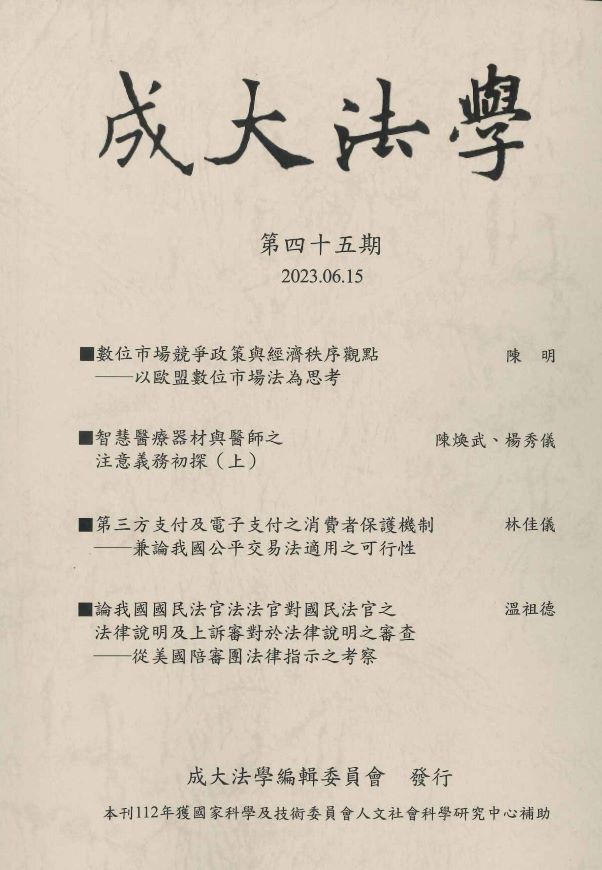前期出版
前期出版
頁數:51﹣97
智慧醫療器材與醫師之注意義務初探(上)
Smart Medical Device and the Physician’s Duty of Care: A Preliminary Study (1)
研究論文
作者(中)
陳煥武、楊秀儀
作者(英)
Huan-Wu Chen, Hsiu-I Yang
關鍵詞(中)
人工智慧、智慧醫療、醫療器材軟體、人機合作、醫師責任
關鍵詞(英)
Artificial Intelligence (AI), Smart Medicine, Software as a Medical Device (SaMD), Human-AI Interaction, Liability of the Physician
中文摘要
智慧醫療產品正風行全球,許多產品已經核准上市。當各界深深期盼智慧醫療器材的應用可以輔助醫師診斷的正確性、提升醫療品質,以及帶來個人化醫療的美好願景之時,關於智慧醫材會如何顛覆醫病關係,影響病人安全,甚至威脅到人類主體性的認識卻付之闕如。大量搭配穿戴裝置而生的醫用軟體以「預防」為名所刺激出來的假性醫療需求,會不會增加醫療體系的負擔?人工智慧的即時更新能力是否會拉高醫師的注意程度到「最高醫療水準」?當智慧醫材的表現已經勝過醫師時,如何重新建構醫師的注意義務,而能在確保智慧醫材的安全性與有效性之餘,避免醫師不至淪為智慧醫材的橡皮圖章?醫師因為信賴智慧醫療器材的判斷而進行侵入性的診療,卻發現是軟體判讀錯誤,該醫療行為造成的不良結果應由何人負責?本文以實際醫療現場的臨床經驗出發,探討智慧醫療器材的規範特徵、可能錯誤類型,以及醫師與智慧醫療器材的「人機互動」關係,並參考國際間對智慧醫材的管制框架,結合國內外法院案例與學者學說,重新檢視應如何分配臨床醫師的「注意義務」,以避免智慧醫材所可能帶來的風險,並藉著責任的分配來維繫人工智慧醫療年代中醫師與病人的主體性。
英文摘要
With the rapid advance in Artificial Intelligence (AI) technology, more and more countries are embracing the concept of Smart Medicine with great enthusiasm. Several AI-based medical devices have been successfully approved by the Food and Drug Administrations and available on market. As people expecting that the application of AI can bring about more accurate diagnosis, better quality of care, and realization of personalized medicine, little attention is paid to the potential misuse and abuse of Smart medical device in altering the physicians-patient relationship, affecting patient safety, and eventually threating human subjectivity. Will the fictitious medical demand stimulated by wearable health-improving devices, in the name of “prevention”, increase the unnecessary burden on the healthcare system? Will the capability of real-time adaptive SaMD drive the physicians’ duty of care to the “highest standard of care”? When AI devices outperform human doctors, how should we reconstruct the “duty of care” of physician-users to prevent physicians from becoming a “rubber stamp” of AI? If a physician makes a wrong diagnosis according to the recommendation by AI, who should be held responsible? This paper tries to answer all these questions through clinical observations, literature reviews and comparative study. The authors carefully analyze the regulatory characteristics of AI Medical Device, types of AI’s errors, and the relationship of “human-AI interaction”. We examine AI-related hard rules, regulations, and soft laws in two major jurisdictions: EU and the USA. We find that maintaining the autonomy and dignity of both physicians and patient is of critical importance in the age of smart medicine.
線上閱覽
全文下載get_app
1.全文公開下載




